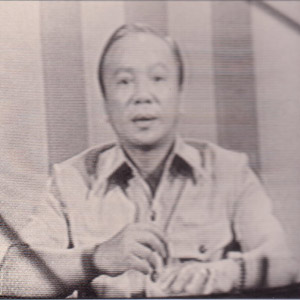

Born on April 5, 1923 in Tri Thuy, Khanh Hai village, Thanh Hai district, Ninh Thuan province (Phan Rang), to a poor farming and fishing family, Nguyen Van Thieu and his family worked every day on a small infertile farm.
After finishing the ninth grade, Thieu moved to Saigon and attended a technical school. Before long, he was expelled for lack of discipline. Thieu entered a school for maritime commerce, where he met Chung Tan Cang (Cang was later appointed as Chief Naval Operations of the South Vietnamese Navy when Thieu was President). Unable to pass the math class, Thieu quit to attend the first course of the Hue officers school (later became the Military Academy of Dalat).
In 1949, Thieu graduated to the rank of Second Lieutenant with grade "Average". In 1952, Lt Thieu was sent to the Military Tactic Academy. Major Duong Van Duc, Captain Nguyen Khanh, Captain Do Mau, Lt Cao Van Vien and myself [Hoang Van Lac] also attended this academy.
After graduating from the Military Tactic Academy, Lieutenant Thieu was appointed Assistant Chief of Staff J3, Hung Yen sector.
After the Geneva Agreement in 1954, Thieu was promoted to Superintendent of Da Lat Military Academy, Commander of the 1st ARVN Division in Thua Thien and Quang Tri area. In 1962, Colonel Thieu was Commander of the 5th ARVN Division in Binh Duong province. Thieu's career took off from here.
During the coup of November 1, 1963, Thieu was to command the 5th Division as the spearhead force to attack Gia Long Palace. However, his forces only hover around the outskirts of Saigon during the most critical time of the coup. After receiving the news that Diem and Nhu had left the palace, and the coup appeared to be successful, Thieu cautiously led his forces to enter the Capital. General Ton That Dinh and Colonel Lam Van Phat were fully aware of Thieu's action. Dinh was Thieu's Commander and Phat was assigned by Dinh to replace Thieu in attacking the Gia Long Palace.
Nevertheless, after the "Revolution", Thieu was the first to be promoted to the rank of Major General. Only 3 months later, Generals Thieu, Khiem, and Khanh had undergone a self-proclaimed "Correction". General Khiem, Thieu's mentor and fellow members of the Can Lao and Dai Viet parties, nominated Thieu to the position of Chief of Staff at the Joint General Staff of the ARVN.
When General Duc and Colonel Ton conducted a defiant "Show of force" and when Phat and Thao conducted a failed coup (Feb 19, 1965), Thieu and Generals Thi and Ky supported General Khanh. For that, Thieu was promoted to the Commander of the IV Corps. Thieu, however, asked General Thi to help assign him to the III Corps (Bien Hoa) which allowed him to be near Saigon. When it became apparent that Generals Thi, Ky and Ambassador Maxwell Taylor wanted to discard Khanh, Thieu dumped Khanh and jumped on the Thi and Ky's bandwagon.
When Ky and Thi had serious conflicts, Thieu stayed aloof, but incited General Nguyen Huu Co into siding with Ky to push Thi into exile. Later, Ky fired Co because Ky knew Co was too close to Thieu. During this time, the civilian government was headed by Prime Minister Phan Huy Quat who was also member of Dai Viet. Thieu knew that he was now the highest ranking military officer. General Minh was sent to exile in Thailand by Khanh on November 7, 1964, Khiem became the Vietnamese Ambassador in Washington since February 26, 1965. Through his brother Nguyen Van Kieu, Thieu was trying to abet Quat into returning the authority to the military council so that he could be the undisputed leader of South Vietnam. Thieu was very clever in hiding his conspiracy. When General Westmoreland met with Thieu, then Minister of Defense, Thieu acted like an outsider and remarked, "The political problems should be solved by politicians. I am only a military man." A few weeks later Thieu became the Chairman of the "National Leadership Council" and Ky, Chairman of the "Central Executive Committee."
In 1965, the first U.S. marines landed in Da Nang and Chu Lai, both Generals Thieu and Ky greeted them assuring the American public that this was what Vietnam wanted. On the contrary, Ambassador Taylor, stationed in France after the second world war, expressed his concern about the lives of American soldiers and the possible social chaos in Vietnam created by the presence of Americans.
As Chairman of the Central Executive Council promoted as the "government of the poor", Ky increased his power by planting his men in key agencies like the Ministry of Economy, Ministry of Rural Development, Ministry of Information and Propaganda, Air Vietnam, etc. Ky assigned a close friend, Air Force Lt Colonel Tran Do Cung, to head the trade office, importing foreign meat, refrigerators, Honda motorcycles, and other commodities which were under a strict import quota. Ky also assigned his people into major positions in the JGS Headquarters, the Divisions, Corps, CIA, National Police, military police, the port authority of Saigon, the Tan Son Nhat Airport, Mayor of Saigon-Cholon, all counties throughout the capital area, and the City of Gia Dinh. Eventually, all Thieu's people lost their jobs. General Dang Van Quang, Thieu's close friend since his youth, was fired by Ky as Commander of Corps IV, and was threatened to be court martialed for corruption. General Hoang Xuan Lam, Commander of Corps I, member of Thieu's Dai Viet Party was concerned about his own safety.
(pp 183-187)
Lac Hoang and Viet Mai Ha
Blind Design
1996